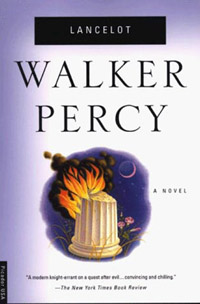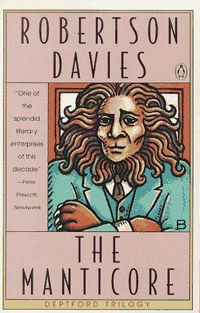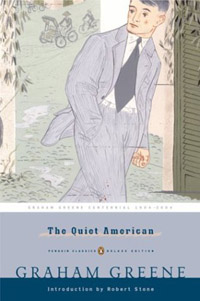Three books about crossing the abyss
Friedrich Nietzsche is associated with nihilism not because he advocated it, but because he saw it as an essential stage. Civilization, sensu Nietzsche, has a life cycle through which it ages and dies as its symbols become increasingly disconnected from reality. For people in a dying civilization, the only hope is a Viking funeral for all values, and then a rediscovery of what matters in life — an awakening.
Since Nietzsche, novelists have attempted to chronicle this awakening in different forms. Thomas Pynchon explicitly mentions it in his short fiction; William S. Burroughs takes us through the darkest depths of hell to find redemption in action; even popular fiction like Paulo Coelho tries to show us an invisible world beyond the world of appearance as dictated by society. Today I mention three classics of this genre from the oldest school of the philosophical novel: how to discover what you’re willing to die for.

Lancelot: A Novel
Walker Percy. Picador, $10
In this short book, a man discovers the life he was living was not what he thought it was, and then leads him to ask the fundamental question: how was I deceived? In fitting with the title, he discovers in himself a knightlike desire to wage warlike action in the name of moral alertness, or being awake to what goes on outside the visible, categorical, plastic-clean definitions used by our society to transact daily function. The book flirts with dangerous ideas and then quickly revokes them, much as Nietzsche flirted and then contradicted, to force us to invoke those issues and then pick our own reality more complex than voting for option A or option B, buying product Z or product W. While its topic is vital and kept me riveted, the use of language is somewhat heavy-handed. In fact, this book would benefit by losing a hundred pages or so (like many novels). There’s a mystery underlying the fundamental event of the novel and how it transpired, but what makes Percy a great writer is that by the time events are revealed, we the reader are so invested in his protagonist that it all seems quite natural, which is where we agree with what I surmise is Percy’s thesis: that in all of us is a Lancelot, and we’re happiest if we not only morally awaken but wage constant moral warfare against the slumbering, ignorant, beastlike complacency and deceptiveness of our species.

The Manticore
Robertson Davies. Penguin, $10
This book approaches a man after The Fall, or his descent into dissolution that masked a deeper void in his soul. He has gone partway through the descent and recovery process Nietzsche describes, wherein he is aware of the hollowness of social reality but cannot yet grasp something better to strive for, and so remains becalmed in negativity and self-destruction, like most people under 45 are today. Although the book is told through Jungian archetypes, its fundamental process is one of rediscovering value by confronting life itself and all of the illusions society uses to cover its fears — mortality, natural selection, failure — and so is a slow, cerebral buildup to an animalistic finale. What is most interesting about this book is that it shows a character before awareness coming to the ground of that awareness, and lets us breathe our own hopes into him instead of closing the cycle. Like all books from this author, it mixes wit with that multi-axial sense of being suspended between emotions and actions that is at home in the modern consciousness, and prized when it is truthful.

The Quiet American
Graham Greene. Penguin, $10
At its simplest level, this is a wartime political novel, written before American involvement in Viet Nam really took on stature, but showing the fundamental flaws not of an army, a political party or a nation, but of an attitude. In this circuitous novel that veers between disturbing action and contemplative scenes of social interaction, characters wrestle with their own balance between wanting to do what is logical and getting caught up in the forest of symbols, emotions, ideals and subterfuges that define the modern West. Much like Heart of Darkness and later Apocalypse Now this shows us people unwilling to win wars, or make their personal lives achieve clarity, because they are ghettoized in their individualism, comfort, and lazy self-deception. Like most books of this genre, it comes to a crashing denouement as one character grows a pair and risks the confrontation with social illusion — not social morality, not its conventions, but the basic illusion of society itself: that now that we’re part of it, we must no longer struggle for clarity, but can let its bureaucratic and unctuous socialization define that for us — and goes to war with the assumptions that lead to misery.
Tags: Books, graham greene, literature, philosophy, robertson davies, walker percy









